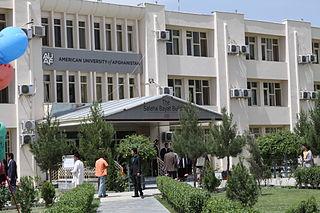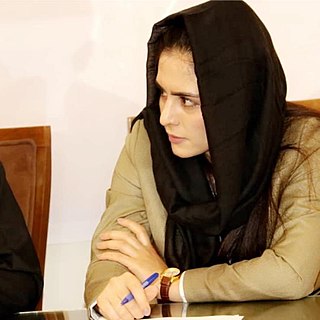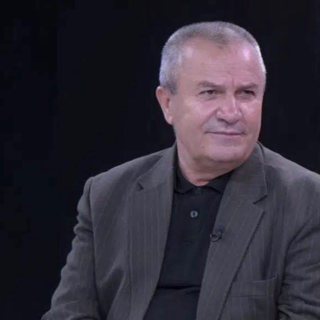Related Research Articles

The Revolutionary Association of the Women of Afghanistan (RAWA) is a women's organization based in Kabul, Afghanistan, that promotes women's rights and secular democracy. It was founded in 1977 by Meena Keshwar Kamal, an Afghan student activist who was assassinated in February 1987 for her political activities. The group, which supports non-violent strategies, had its initial office in Kabul, Afghanistan, but then moved to Pakistan in the early 1980s.

The treatment of women by the Taliban refers to actions and policies by various Taliban regimes which are either specific or highly commented upon, mostly due to discrimination, since they first took control in 1996. During their first rule of Afghanistan (1996–2001), the Taliban were notorious internationally for their misogyny and violence against women. In 1996, women were mandated to wear the burqa at all times in public. In a systematic segregation sometimes referred to as gender apartheid, women were not allowed to work, nor were they allowed to be educated after the age of eight. Women seeking an education were forced to attend underground schools, where they and their teachers risked execution if caught. They were not allowed to be treated by male doctors unless accompanied by a male chaperone, which led to illnesses remaining untreated. They faced public flogging and execution for violations of the Taliban's laws.

Education in Afghanistan includes K–12 and higher education, which is under the Ministry of Education and Ministry of Higher Education. In 2021, there were nearly 10 million students and 220,000 teachers in Afghanistan. The nation still requires more schools and teachers. Soon after the Taliban takeover of the country in August 2021, they banned girls from secondary education. Some provinces still allow secondary education for girls despite the ban. In December 2022, the Taliban government also prohibited university education for females in Afghanistan, sparking protests and international condemnation. In December 2023, investigations were being held by the United Nations on the claim that Afghan girls of all ages were allowed to study at religious schools.
Sex segregation refers to the physical and spatial separation of humans by sex in public or private places. In public places, women are forced to wear the burqa at all times, because, according to one Taliban spokesman, "the face of a woman is a source of corruption" for men not related to them (Non-Mahram).

Women's rights in Afghanistan have oscillated back and forth depending on the time period as well as the regime in power. After King Amanullah Khan's attempts to modernize the country in the 1920s, women officially gained equality under the 1964 Constitution. However, these rights were taken away in the 1990s through different temporary rulers such as the mujahideen and the Taliban during the Afghan civil war. During the first Taliban regime (1996–2001), women had very little to no freedom, specifically in terms of civil liberties. When the Taliban was overthrown by the United States following the 9/11 attacks, women's rights gradually improved under the presidential Islamic Republic of Afghanistan. Women were de jure equal to men under the 2004 Constitution.

Fawzia Koofi is an Afghan politician, writer, and women's rights activist. Originally from Badakhshan province, Koofi was recently a member of the Afghan delegation negotiating peace with the Taliban in Doha Qatar. She is an ex Member of Parliament in Kabul and was the Vice President of the National Assembly.

Roya Rahmani is an Afghan diplomat who served as Afghanistan's first female ambassador to the United States and non-resident ambassador to Mexico, Argentina, Colombia, and the Dominican Republic from December 2018 to July 2021. She is currently the Chair of the international advisory company in development finance — Delphos International LTD. She is also a distinguished fellow at the Georgetown Institute for Women, Peace, and Security, a senior advisor at the Atlantic Council's South Asia Center, and a senior fellow for international security at the New America Foundation. From 2016 to 2018, she served as Afghanistan's first female ambassador to Indonesia, first ever ambassador to the Association of Southeast Asian Nations, and non-resident ambassador to Singapore.

Zarifa Ghafari is a former female mayor of Maidan Shahr, capital city of the Wardak Province, Afghanistan. Ghafari was one of the few Afghan female mayors, next to the first Afghanistan's mayor, Azra Jafari and Khadija Zahra Ahmadi, and was also the youngest to be appointed, at the age of 24. She is known for her efforts to advance women's rights in Afghanistan. Ghafari was chosen as an International Woman of Courage in 2020 by the US Secretary of State. She has survived three assassination attempts.
Sam Mort is currently Chief of Communication, Advocacy and Civic Engagement for UNICEF Afghanistan, based in Kabul. Officially based in New York, she is currently 'one of the few Westerners left' after evacuations from Kabul. Afghanistan is in the midst of a Taliban offensive, where the insurgents have now taken over from the elected government. She previously announced that Unicef had made a historic deal to have girls educated in the Taliban-controlled areas of the country in 2020.

On 15 August 2021, Afghanistan's capital city of Kabul was captured by the Taliban after a major insurgent offensive that began in May 2021. It was the final action of the War in Afghanistan, and marked a total victory for the Taliban. This led to the overthrowing of the Islamic Republic of Afghanistan under President Ashraf Ghani and the reinstatement of the Islamic Emirate of Afghanistan under the control of the Taliban.
Rangina Hamidi is an Afghan-American writer, educator, social activist, and politician. She is well known as an advocate for women's rights in Afghanistan and has engaged in various social projects to empower girls and women in Afghanistan. Hamidi has served as an education minister of Afghanistan, until the Taliban takeover. She was the first female education minister of Afghanistan. During the Afghanistan being taken over by the Taliban, she vowed to stay in Afghanistan and continue her humanitarian efforts by actively involving in empowerment of Afghan women. However, after several weeks, she fled with her family to Arizona.
Protests in Afghanistan against the Taliban started on 17 August 2021 following the Fall of Kabul to the Taliban. These protests are held by Islamic democrats and feminists. Both groups are against the treatment of women by the Taliban government, considering it as discriminatory and misogynistic. Supported by the National Resistance Front of Afghanistan, the protesters also demand decentralization, multiculturalism, social justice, work, education, and food. There have been pro-Taliban counterprotests.

Crystal Bayat is an Afghan social activist and human rights advocate known for her protests against the Taliban takeover, advocacy for women rights and political activism inside and outside Afghanistan. A native of the Ghazni province, Shia (coming from the Bayat family, a Turkic ethnicity minority. Bayat was born in 1997 in Kabul. She grew up most of her life with democracy and positive societal changes. She is currently continuing the fight to preserve Afghan human right's achievements as an agent of change.

Dr. Faizullah Jalal was born on 22 May 1963 in Badakhshan, Afghanistan. Being a first generation college and high-school student, he served as a law and political science professor at the Kabul University for more than 35 years. He also served as head of the Department of Law and Political Science for 14 years, as the Vice-Chancellor of the Kabul University, and as Deputy Minister for Academic Affairs in the Ministry of Higher Education of Afghanistan. Professor Jalal has a bachelor's degree in Law and Political Science from Kabul University and a master's and Ph.D. in Political Science from the Tajik National University. He is the author of several published books and a variety of articles. His recent books include (1) Political Power and Nation-Building in Afghanistan, (2) The Face of International Terrorism, and (3) An Inquiry into Violence Against Women in Afghanistan.
Zahra Joya is an Afghan journalist. She is the founder of Rukhshana Media, an outlet in Persian and English which she runs from exile.
Roshanak Wardak is an Afghan gynaecologist and former politician from Maidan Wardak Province. In 2021, she was named as one of the BBC's 100 Women, alongside fifty other Afghan women.
Events in the year 2023 in Afghanistan.
Hoda Khamosh, born in 1996, is an Afghan journalist, poet, and a women's rights activist.
Ismail Mashal is an Afghan educator and former journalist who received international press attention in 2022 due to his public criticisms of the Taliban's decision to ban education for women and girls, which led to him being imprisoned in February 2023.
Razia Barakzai is an Afghan women's rights activist. She was named one of the BBC's 100 Women in 2021 for her work in leading the first women's protests against the Taliban in August 2021, following their takeover of Afghanistan that same month.
References
- ↑ "BBC 100 Women 2021: Who is on the list this year?". BBC News. 2021-12-07. Retrieved 2024-03-08.
- 1 2 3 4 5 6 7 8 9 "The librarian who defied the Taliban". BBC News. 2022-08-11. Retrieved 2024-03-08.
- ↑ "One Year On, the Taliban Still Attacking Girls' Right to Education". Human Rights Watch. 2023-03-24. Retrieved 2024-03-08.
- ↑ "How the Taliban has changed Afghanistan, a year after taking power". PBS NewsHour. 2022-08-30. Retrieved 2024-03-08.
- ↑ Unterhalter, Elaine (2022-08-23). "The history of secret education for girls in Afghanistan – and its use as a political symbol". The Conversation. Retrieved 2024-03-08.
- ↑ "Reaffirming our commitment to the brave women of Afghanistan". Amnesty International. 2023-03-07. Retrieved 2024-03-08.
- ↑ "Os diários secretos de mulheres afegãs após chegada do Talebã ao poder". Época Negócios (in Brazilian Portuguese). 2022-08-23. Retrieved 2024-03-08.
- 1 2 3 4 "Women, Protest and Power- Confronting the Taliban". Amnesty International. 2023-03-07. Retrieved 2024-03-08.